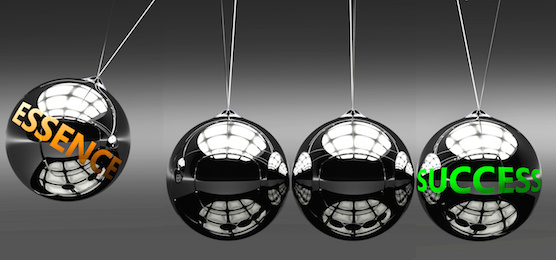Just-in-Time Planning
How “Planned Evolution”
Ensures You Finish Complex, Long-Term Projects
This class teaches a revolutionary way to plan complex, long-term projects so you can finish them. I call this approach “Just-in-Time Planning,” because it rejects both the over-planning that bogs down many ambitious undertakings, and the arbitrary “just do something” approach, which leads to shoddy work and wasted effort.
 How much time has gone down the drain in ambitious projects that are never finished? How many work projects limp along without results until mercifully canceled?
How much time has gone down the drain in ambitious projects that are never finished? How many work projects limp along without results until mercifully canceled?
When there’s been time invested, but no progress, it can seem like the task is impossible. But that is rarely the case. Moreover, when you have a desire to do something you believe is impossible, that is a signal that there’s an important value at stake. Why else would you — or your company — want something that seems to contradict reality?
Learn a flexible method for planning the most complex tasks by working through the process on a major goal of your own.
You will receive:
- A PDF summary sheet with the key elements of the process
- A 42-page PDF class workbook with all of the details of the process, including space for in-class exercises
- Access to a podcast with the 6-hour class plus 9 bonus recordings for easy listening
- A 3-month free trial in the Thinking Lab with live classes and group coaching calls plus dozens of additional online resources
Cost $225
 Note: These workshop recordings are included in the Thinking Lab.
Note: These workshop recordings are included in the Thinking Lab.
- How to make tangible progress on open-ended projects so you never lose momentum on them
- First-Aid for dealing with overwhelming complexity when you first start a project
- A powerful tool for ensuring you get the best possible results within your time or budget constraints
- The key to defusing perfectionism that stops you from finishing
This class reflects my (Jean Moroney’s) distinctive perspective on planning. I generalized the method from my eclectic experiences. As an engineer, I made prototypes, wrote pseudo-code, and did proof of concept experiments. As a writer, I identify themes, make outlines, and write synopses. When I paint, I start with a sketch, then put in the major blocks, then the details. All of these processes have one thing in common: they get the basics done first, then build on that foundation. If you are an entrepreneur, you may have seen similar concepts in the “Lean” movement.

I turned to JIT planning, or what I think of as the “bare bones” approach, which is just one skill of many I learned in Jean’s Thinking Lab. It saved the job and revealed an important missing step, which I had never expected.
Among other things, I needed to use my “bare bones” method to guide my subcontractors. They were overwhelmed with their pieces of the project, too. I remember seeing their bewildered looks and hearing their skeptical exclamations as they contemplated the job. It was fear in their eyes and in their snorts. It’s funny in hindsight, but that’s because it turned out so well. Once I finished the planning (in about five months), it was easy. We moved rapidly through the construction phase and delivered a gorgeous result to the client.
Jean’s JIT Planning tool is so useful. I use the method in many areas. Hiring, accounting, taxes, directing staff, instructing subcontractors, etc. It helped me identify one of the best methods for business growth. It gave me leadership skills. These days it is totally automatized. That just shows how far I have traveled.
In Unit 1: Vetting Your Project, you will get fast tools for getting an overview on the most complex of tasks and access your deepest motivation for doing it, so you can make strategic decisions about how to proceed.
In Unit 2: Quick & Dirty Planning, you will learn how to make the first crucial decisions for how to approach a complex project, laying a foundation for ensuring you get payoffs sooner rather than later.
In Unit 3: Planning to Evolve, you will learn a unique way of visualizing how your project will unfold — from this week to its end, months or years away. You will learn the two key models for breaking a task down to its basics and building it up again to the complete version, such that you never lose momentum on the project or fall into perfectionism. You will work through this process on your own project.
In Unit 4: Contingency Planning, you will learn how to do due diligence to ensure you are not setting yourself up for failure. We specifically discuss limiting beliefs — a huge barrier to finishing — and how to challenge them effectively.
Just-in-Time Planning gives you the overall concept and method. Each bonus class is a deep dive into different aspects of the process. Pick and choose the ones you need, or listen to the all!
- Finishing Sooner Rather than Later
- Planning Focus Time
- Value-Oriented Resolutions
- Mental Stopping Points & Finishing Points
- How to Generate “Helpful” Questions for Your Own Thinking
- Digging into the Details of a Complex Project
- Daily Planning
- Weekly Planning
- Group Coaching Outtakes

Learn a flexible method for planning the most complex tasks by working through the process on a major goal of your own.
You will receive:
- A PDF summary sheet with the key elements of the process
- A 42-page PDF class workbook with all of the details of the process, including space for in-class exercises
- Access to a podcast with the 6-hour class plus 9 bonus recordings for easy listening
- A 3-month free trial in the Thinking Lab with live classes and group coaching calls plus dozens of additional online resources
Cost $225
 Note: These workshop recordings are included in the Thinking Lab.
Note: These workshop recordings are included in the Thinking Lab.
Here are my standard suggestions for a major task you may need to plan, which are suitable to work on in this class:
- Plan a major event (kickoff meeting, company retreat, conference, wedding)
- Coach a particular person to success (train a new hire, get an existing team member to improve performance, get the kids to _____)
- Organize something (an office procedure, the filing system, the attic)
- Make a strategic plan (plan profits, plan new product development, make a personal financial plan)
- Write a major document (proposal, report, requirements document, book)
- Give a major presentation (to the customer, to your group, to your club)
When you choose a topic for this class:
- Make sure you pick a specific project to do, not “organize my whole life.”
- Make it a “doing” project, not a “figuring out” project. (So, don’t make your project something like, “figure out why so-and-so is not performing.”)
- Choose a project that you are qualified to do, not one that would require significant training.
- It’s best if it is an actual project on your agenda.


Finishing Sooner Rather Than Later
In my Launch program, most participants indeed achieve a major goal in 8 weeks. How do they do that? In this free Zoom call, I will explain the unique goal-setting and planning process that makes this possible.
A Free 1-Hour Webinar
The session was recently held.
In addition, you will find on the site page a summary sheet with a convenient summary of the process, plus a workbook with details of the process for quick review.
After class, you get three months in the Thinking Lab, where you can access:
- Live virtual classes going deeper on the skills
- Over 100 hours of additional course material
- Write-ups on dozens of related thinking tactics
- One “Thinking Day” – a day you can join other Thinking Lab members virtually to work on a high priority project, ask questions of Jean, or just get encouragement to stay on task
- Unlimited email feedback on work you submit for review during your time in the lab
Learn a flexible method for planning the most complex tasks by working through the process on a major goal of your own.
You will receive:
- A PDF summary sheet with the key elements of the process
- A 42-page PDF class workbook with all of the details of the process, including space for in-class exercises
- Access to a podcast with the 6-hour class plus 9 bonus recordings for easy listening
- A 3-month free trial in the Thinking Lab with live classes and group coaching calls plus dozens of additional online resources
Cost $225
 Note: These workshop recordings are included in the Thinking Lab.
Note: These workshop recordings are included in the Thinking Lab.
Why is this class so different? Because it is based on a rational view of productivity.
Productive work is effort devoted to creating values — values that support human life. It is the greatest, most creative use of your time. Logically, it ought to be self-motivating and self-sustaining. But it won’t be if you don’t finish what you start.
 The value only comes to be if you finish something. The joy of work comes when you complete some objective result. If you don’t have a way to see your own progress, you will lack the emotional fuel to keep going. Work will become a slog.
The value only comes to be if you finish something. The joy of work comes when you complete some objective result. If you don’t have a way to see your own progress, you will lack the emotional fuel to keep going. Work will become a slog.
Nobody ever achieved a truly ambitious goal by slogging through. It can’t be done. When you’re slogging, your mind is starved for values, and you don’t have the creativity you need to solve the challenging problems.
But when you use the Just-in-Time Planning process, you gain the confidence that you can finish any project you care about.
We still have a lot of work to do, but seeing results is so motivating. Plus, JIT planning helped ensure that our in-between state is a great state. We prioritized enjoying being here. Over breakfast, we watch deer feeding in the backyard. In the evenings, we walk to the pond and feed the catfish, then watch the bats circling overhead. The cats are all settled into their new routine. We are also exercising and eating well. It was very important to me to make sure these didn’t fall by the wayside in our new circumstances—and so as part of JIT Planning, we built that into the move sooner rather than later.
 So how does it work? The bottom line is: Focus on the basics. The basics are not “small steps” or “what’s easy.” Yes, the basics need to be simple and easy, but they are also fundamental. They are “that upon which everything else depends in the context.” How do you find those fundamentals? That is a thinking process. First, only you can figure out what is fundamental in this context. You know the goal. You know the value of achieving it. That is the context you need to strip the goal down to its essentials. But identifying the essential value of a project requires critical thinking that nobody teaches you. Second, only you know the exact state of your own knowledge. How many times have you been given an allegedly step-by-step process, only to discover you have no idea how to take one of the steps? You need to figure out a plan to complete your project that factors in what you know and what you don’t know — without turning research into an end in itself.
So how does it work? The bottom line is: Focus on the basics. The basics are not “small steps” or “what’s easy.” Yes, the basics need to be simple and easy, but they are also fundamental. They are “that upon which everything else depends in the context.” How do you find those fundamentals? That is a thinking process. First, only you can figure out what is fundamental in this context. You know the goal. You know the value of achieving it. That is the context you need to strip the goal down to its essentials. But identifying the essential value of a project requires critical thinking that nobody teaches you. Second, only you know the exact state of your own knowledge. How many times have you been given an allegedly step-by-step process, only to discover you have no idea how to take one of the steps? You need to figure out a plan to complete your project that factors in what you know and what you don’t know — without turning research into an end in itself.Let’s sum up what you get for your investment:
- A planning process that makes the most complex projects tractable
- Powerful tools for finding a place to start that ensure you don’t bog down
- The secret to resolving time and quality conflicts, including perfectionism
- The key to making objective progress you can show yourself — and your boss — without driving yourself crazy
- A chance to work through the process on a project of your own during the workshop
- Surprising insights about what you really want to achieve with your project
- A PDF of my Thinking Tactics manual: The Thinker’s Toolkit
- A 2-page PDF summary sheet for quick reference
- A 6-hour class and 9 bonus recordings
- Complimentary membership in the Thinking Lab from the time you register to three months after the class so you can get more tactics, more practice, and more help
 me abstract theory says it’s possible. But because you see your way forward, and that it will pay off — at least to some degree — sooner rather than later. This is a radically empowering perspective. When you gain the conviction you can get results, you see your own power to create your future. I’m not saying that everyone taking the class will gain that confidence in just 7 hours. But in the class, you will see that it is possible, and lay the foundation to gain it over time.
me abstract theory says it’s possible. But because you see your way forward, and that it will pay off — at least to some degree — sooner rather than later. This is a radically empowering perspective. When you gain the conviction you can get results, you see your own power to create your future. I’m not saying that everyone taking the class will gain that confidence in just 7 hours. But in the class, you will see that it is possible, and lay the foundation to gain it over time.That’s why I always include time in the Thinking Lab after the class — so that you have support to further learn, practice, and automatize this approach. In particular, there are half a dozen recorded classes available, in which we work through a wide variety of cases using the Just-in-Time Planning process.
Sign up now and learn how to plan your complex, long-term projects so that you always succeed.
Learn a flexible method for planning the most complex tasks by working through the process on a major goal of your own.
You will receive:
- A PDF summary sheet with the key elements of the process
- A 42-page PDF class workbook with all of the details of the process, including space for in-class exercises
- Access to a podcast with the 6-hour class plus 9 bonus recordings for easy listening
- A 3-month free trial in the Thinking Lab with live classes and group coaching calls plus dozens of additional online resources
Cost $225
 Note: These workshop recordings are included in the Thinking Lab.
Note: These workshop recordings are included in the Thinking Lab.
